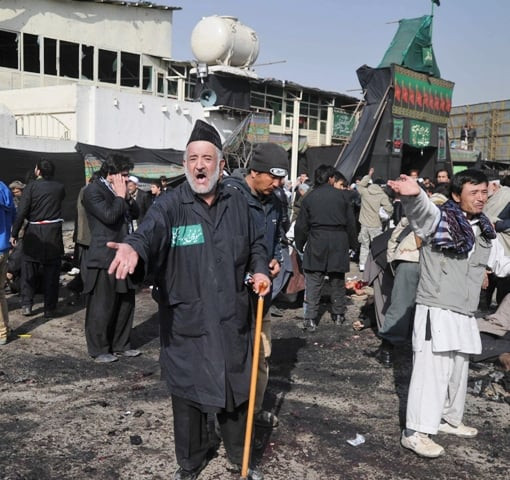Afghan attacks raise fears of sectarian violence
Analysts say response of Shia leaders is now key to determining whether splits emerge between Sunnis, Shias.

The Afghan Taliban has denied responsibility for the blasts in Kabul and the northern city of Mazar-i-Sharif, and leading Shias in Afghanistan have pointed the finger of blame at groups in Pakistan.
Analysts say the response of Shia leaders is now key to determining whether splits emerge between Afghanistan's Sunni Muslims, and Shias who make up roughly 20 percent of the population.
The scale of the attacks was unprecedented in Afghanistan, which until now had not been hit by the kind of sectarian violence that devastated Iraq after the 2003 US-led invasion in a bid to sow civil war.
The Afghan state is already fragile, with different ethnic groups including Pashtuns, Tajiks, Hazaras and Uzbeks living together, sometimes uneasily, under one flag as a decade-long war rumbles on with no end in sight.
It remains unclear who would have the most to gain from whipping up sectarian conflict in Afghanistan, where people have voiced increasing fears of civil war after the scheduled departure of Nato combat troops in 2014.
So far, Shia leaders have urged calm in the aftermath of the unprecedented attacks.
The Shia ulema council, seen as a figurehead for Shias in Afghanistan, promptly issued a statement condemning the attack while urging the community not to respond with violence.
Mohammad Mohaqqiq, an ethnic Hazara and leader of one of Afghanistan's main Shia political parties, issued a statement calling on Afghans to approach the aftermath of the violence "thoughtfully and carefully".
Some leading Shias voiced optimism that insurgents would not succeed in opening up divisions.
Alemi Balkhi, a Shia lawmaker, said people were "aware of the conspiracies" and would be patient.
But analyst Ahmad Saeedi said the threat of longer-term implications from the attack was real.
He claimed that elements in Pakistan, which boycotted Monday's Bonn conference on Afghanistan's future after a Nato air strike killed 24 Pakistani soldiers, were worried about developments including Kabul's ongoing negotiations with Washington over a strategic partnership deal.
"It is a danger as despite the relative peace, relations between Afghan Shias and Sunnis have remained fragile," he said.
"We have witnessed some sectarian violence in the past. Sectarian violence can erupt here if provoked. This would lead to chaos from which the perpetrators can benefit."
Many Afghans are deeply sceptical of Pakistan's role in Afghanistan, accusing it of offering safe havens to insurgents and orchestrating attacks.
Islamabad counters by saying that it too has suffered at the hands of the Taliban and insists it has a key role to play in any moves towards peace negotiations, currently badly stalled.
Shias -- who faced brutal persecution under the 1990s Taliban regime -- have stepped up their mourning rituals in Kabul this year, with black shrines and flags dotting many locations in the city where they have never been before.
However, it is still not clear whether this prominence helped encourage the attack or whether there was another motivation, perhaps political.
"The attacks looked designed to intentionally spark ethnic and sectarian violence but they could also galvanise resistance against what is seen as outside efforts to further disrupt Afghanistan's already besieged relations," wrote Kate Clark of Kabul think-tank the Afghanistan Analysts Network.
"In order to understand the longer-term implications of (the) killings, we need to know who was behind the attack, what the intended message was and who the message was aimed at.
"And we can only hope that these were one-off attacks, never to be repeated."



















COMMENTS
Comments are moderated and generally will be posted if they are on-topic and not abusive.
For more information, please see our Comments FAQ